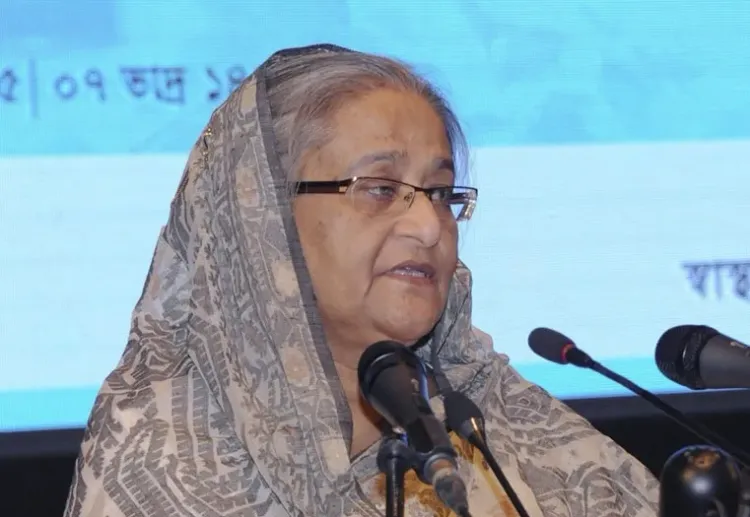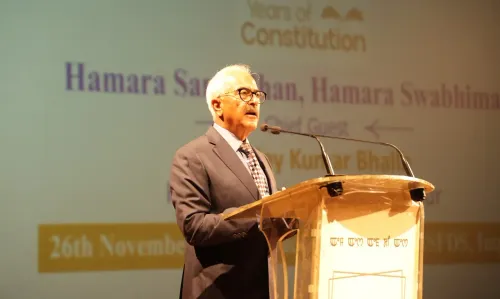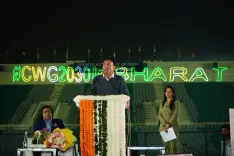Is the Verdict Against Sheikh Hasina a Warning for Bangladesh?

Synopsis
Key Takeaways
- Sheikh Hasina's death sentence reflects a politically charged legal environment.
- The tribunal's structure was altered to suppress dissent.
- Due process was systematically dismantled during the trial.
- Political retribution can undermine the rule of law.
- The case serves as a cautionary tale for the future of justice in Bangladesh.
Dhaka, Nov 26 (NationPress) The death penalty imposed on Bangladesh's former Prime Minister Sheikh Hasina exemplifies a politically motivated execution cloaked in legal formalities, sanctioned by an unelected body, and revealed through a tribunal engineered to eliminate a former leader who once posed a challenge to the very entities now judging her. The decision rendered against Hasina is not simply a failure of justice; it serves as a cautionary tale for Bangladesh, as detailed in a report released on Wednesday.
"For countless Bangladeshis who have endured military takeovers, caretaker administrations, and political turmoil, the ruling feels horrifyingly familiar — yet also unprecedented. This time, the dismantling of due process was intentional. The legal framework was swiftly demolished and reconstructed, not to reveal the truth but to silence a political adversary and reshape the nation's narrative. This was not justice succumbing to pressure; this was justice systematically suffocated," wrote political analyst Anjuman A Islam in the Eurasia Review.
He pointed out that Bangladesh's interim government, under Muhammad Yunus, made no secret of its motives as the International Crimes Tribunal (ICT), established to deliver justice for the atrocities of 1971, was altered through executive mandates that fundamentally changed its structure. These modifications were neither debated nor scrutinized by any elected body; they were simply enforced.
Investigators were granted the authority to conduct searches and seizures without judicial supervision. The time allotted for the defense was slashed from six weeks to three, making it nearly impossible for any legal team to review evidence, call witnesses, or mount a coherent defense. Prosecutors were empowered to issue their own search warrants, circumventing the tribunal entirely, as highlighted in the Eurasia Review report.
The Yunus administration also revised the ICT Act to bar anyone charged — not convicted — from participating in elections or holding public office. Consequently, a mere accusation became a tool for eliminating rivals without the necessity for proof. The ruling against Hasina undermined the credibility of the former PM and paved the way for those who could never defeat her at the polls.
"Hasina was deprived of substantial legal representation. Her defense team faced restrictions on time, access, and resources. They were hindered from effectively cross-examining witnesses. Efforts to introduce counter-evidence were outright rejected or categorized as 'irrelevant.' Requests for expert testimony were declined without justification. International human rights standards mandate that defendants tried in absentia receive an automatic right to retrial. Hasina was denied this opportunity. The tribunal provided no guarantees that she could contest the charges upon her return. This was not a trial; it was a performance with a predetermined outcome," the analyst asserted.
The ruling against Sheikh Hasina illustrates that courts can be manipulated by the powerful, and that political revenge can masquerade as legal proceedings.
"Bangladesh is at a dangerous crossroads. A judiciary reshaped by decree cannot safeguard the innocent. A tribunal that alters rules to meet political aims cannot earn respect. And a court that issues a death sentence through a process filled with coercion, secrecy, and political bias cannot claim legitimacy. The verdict against Sheikh Hasina is more than a miscarriage of justice; it is a warning to the nation. It alerts that courts can be wielded as instruments of the powerful. It warns that political retribution can pretend to be lawful. And it cautions that a nation founded on the promise of justice can lose its ethical direction when truth becomes perilous. If justice can be rewritten for one leader, it can be rewritten for anyone," the report emphasized.









